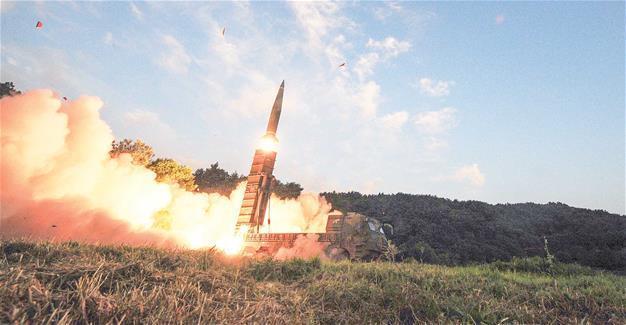World seeks response to rising Korea crisis

North Korea’s biggest-ever nuclear test and declaration it had a hydrogen bomb prompted worldwide condemnation from leaders, as well as thoughts on possible responses they could adopt.
Japan on Sept. 4 urged the U.N. Security Council to agree on a plan to draft a new sanctions resolution to punish Pyongyang after its sixth nuclear test.
“We cannot waste any more time,” Japanese Ambassador Koro Bessho told reporters ahead of an emergency council meeting.
“We need North Korea to feel the pressure -- if they go down this road there will be consequences.”
After the test on Sept. 3 the United States warned it could launch a “massive military response” to threats from North Korea that would be “both effective and overwhelming.”
“We are not looking to the total annihilation of a country, namely North Korea,” Defense Secretary Jim Mattis said, but warned: “We have many options to do so.”
At their summit in China, the North’s key ally, the five-nation BRICS grouping -- taking in the host nation as well as Brazil, Russia, India, and South Africa -- also said Sept. 4 it “strongly deplores” the test.
“We strongly deplore the nuclear test conducted by the DPRK,” BRICS leaders said, using the initials of North Korea’s official name.
“We express deep concern over the ongoing tension and prolonged nuclear issue on the Korean Peninsula,” said the declaration, adding that BRICS collectively believe the issue “should only be settled through peaceful means and direct dialogue of all the parties concerned.”
The summit includes Indian Prime Minister Narendra Modi and presidents Vladimir Putin of Russia, Michel Temer of Brazil and South Africa’s Jacob Zuma.
Russia and China have been pressing for a diplomatic solution.
Putin condemned the nuclear test in a phone call with Japanese Prime Minister Shinzo Abe, according to the Kremlin, but called for diplomacy.
Meanwhile, Seoul said that North Korea could be preparing another missile launch, adding that it strengthened its defenses.
The South and the United States will deploy more of the Terminal High-Altitude Area Defense (THAAD) missile launchers that have infuriated Beijing, the defense ministry said.
The announcement came after Seoul fired an early-morning volley of ballistic missiles in an exercise simulating an attack on the North's nuclear test site.
Pictures showed South Korean short-range Hyunmoo missiles roaring into the sky in the pale light of dawn from a launch site on the east coast.
Pyongyang said the device it detonated on Sept. 3 was a hydrogen bomb -- far more powerful than the fission-based devices it is believed to have previously tested -- and small enough to fit into a missile.
The blast threw down a new gauntlet to President Donald Trump, after the North in July twice tested an intercontinental ballistic missile (ICBM) that appeared to bring much of the U.S. mainland into range, and threatened to send a salvo of missiles towards the U.S. territory of Guam.
South Korean Defense Ministry officials estimated its strength at 50 kilotons -- five times the size of the North's previous nuclear test.
They did not confirm whether it was a hydrogen bomb, saying only that "a variety of nuclear material" had been used.
But Defense Minister Song Young-Moo said Seoul believed Pyongyang had succeeded in miniaturising its nuclear weapons to fit into an ICBM.
The South had requested the U.S. deploy strategic assets such as aircraft carriers and bombers to the peninsula, he said, but denied reports Seoul was seeking the return of U.S. tactical nuclear weapons.
Trump called an emergency meeting of his national security advisers and had his second telephone call of the weekend with Prime Minister Abe.
But he did not talk to South Korea's Moon Jae-In for more than 24 hours -- instead accusing Seoul of "appeasement", raising jitters in Seoul about the two countries' decades-old alliance.
Moon, who advocates engagement as well as penalties to bring Pyongyang to the negotiating table, called for new United Nations sanctions to "completely isolate North Korea."
But Trump criticised the U.S. treaty ally on Twitter, saying: "South Korea is finding, as I have told them, that their talk of appeasement with North Korea will not work, they only understand one thing!"
Despite fears of a possible radioactive leak after the apparent collapse, Japanese and Chinese scientists said they had detected no radiation in the atmosphere.
Swiss ready to play mediator role in North Korea crisis, president saysNeutral Switzerland is prepared to act as mediator to help resolve the North Korea crisis, including by hosting ministerial talks, Swiss President Doris Leuthard said on Sept. 4.
Leuthard said Swiss troops were deployed on the demarcation zone between South Korea and North Korea and the country had a long history of neutral diplomacy. But China and the United States had to take their share of responsibility, she added.
"We are ready to offer our role ...as a mediator," Leuthard told a news conference. "It is really time now to sit down at a table. Big powers have a responsibility."
 North Korea’s biggest-ever nuclear test and declaration it had a hydrogen bomb prompted worldwide condemnation from leaders, as well as thoughts on possible responses they could adopt.
North Korea’s biggest-ever nuclear test and declaration it had a hydrogen bomb prompted worldwide condemnation from leaders, as well as thoughts on possible responses they could adopt.